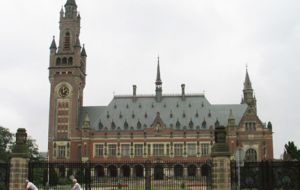MercoPress. South Atlantic News Agency
Guatemala and Belize agree to take border dispute to The Hague
 International Court of Justice in The Hague
International Court of Justice in The Hague Guatemala and Belize signed an agreement on Monday to have their century long territorial dispute settled by the International Court of Justice in The Hague, following a referendum on both countries supporting the ICJ initiative.
The signing ceremony of what has been described as a "compromis" took place on Monday at the Headquarters of the Organization of American States (OAS) in Washington DC. The special agreement sets the guideline on the way forward for both countries to deal with the dispute, should it go to the ICJ. Prime Minister Dean Bar Barrow noted that the signing of the special agreement does not automatically presage the holding of the referendum. Belizeans have been very sceptical about any question on Belize's territorial rights being put before an international court, but Barrow, a legal mind himself, says that the chance of a favourable outcome for Belize is very high and it should put the dispute to rest. Guatemalan political leaders have themselves been reluctant to put the issue to the ICJ, fearing that the outcome would not be in favour of Guatemala, although Belize has much to lose. The secret documents which entail the bone of contention for the ICJ to rule on has yet to be made public and PM Barrow had advanced the documents may be released this week following the Washington ceremony. The move to international adjudication as a means of resolving the dispute was accepted by both countries earlier this year, and the Special Agreement 'Compromis' sets out the parameters for taking this forward to the International Court of Justice. However taking the issue to the ICJ will cost millions of dollars, but the Belize negotiating team says that while tax payers will have to share some of the expense, it is expected that friendly nations to Belize will also provide financial assistance. From London Foreign Office Minister, Gillian Merron, commented on the special agreement signed by Belize and Guatemala saying "I very much welcome Belize and Guatemala's signing of a Special Agreement setting out the terms for taking their territorial dispute to the International Court of Justice in The Hague. This is an important step that demonstrates a positive commitment by both governments to reach a mutually agreed solution". Merron also underscored the significant role played by OAS in facilitating the Agreement and "I welcome their announcement that they will create and administer a fund to contribute to the legal costs both countries will incur preparing their respective cases. I am pleased to announce that the UK will make an initial contribution of £200,000 to this fund". The territorial dispute between Belize and Guatemala dates back to 1859. Belize (formerly British Honduras) became self-governing in 1974, and from 1975 successive UN resolutions endorsed Belize's right to self-determination, independence and territorial integrity and in 1981 Belize became an independent state recognised by all states except Guatemala. Guatemala only recognised Belize as a sovereign state in 1991, but the two countries have been unable to agree their mutual border and Guatemala has maintained a territorial claim on part of Belize. However since 2000, Belize and Guatemala have held a series of meetings under the auspices of OAS in an attempt to resolve the dispute through peaceful negotiation. The OAS maintains a local office in the border zone which works to prevent the escalation of incidents and disagreements in the area.




Top Comments
Disclaimer & comment rulesCommenting for this story is now closed.
If you have a Facebook account, become a fan and comment on our Facebook Page!